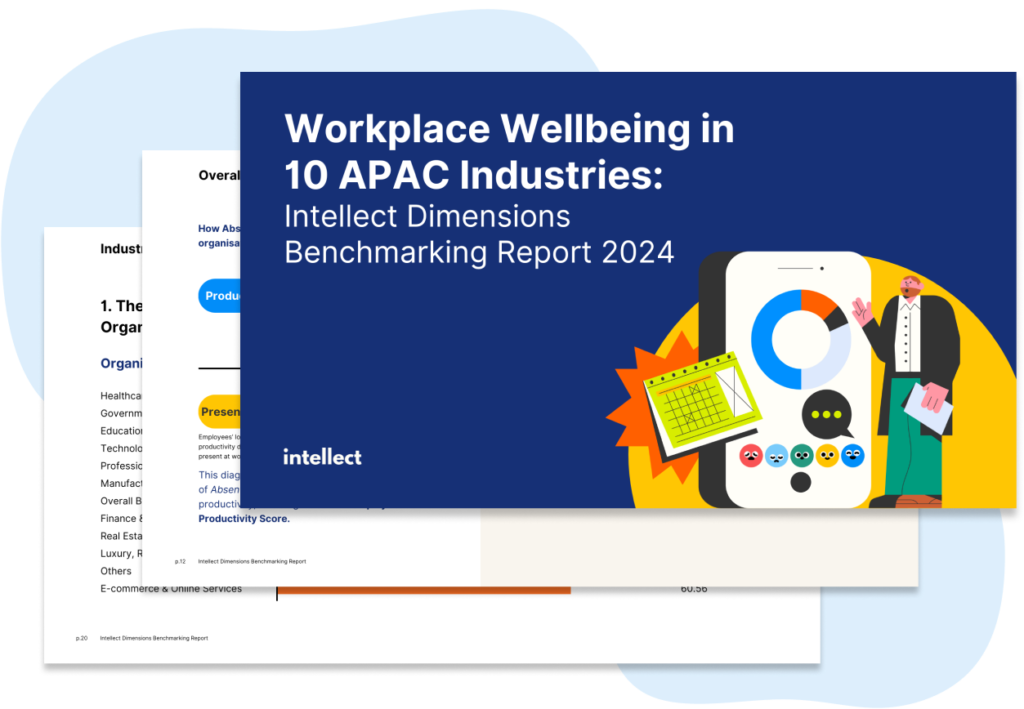A great many wise men have underscored the importance of “knowing thyself”, and the employees in the Government and Non-profit sector likely concur, given that their industry ranked first for Self Awareness among the 13 attributes evaluated across ten industries:
- E-commerce and Online Services
- Education
- Finance and Insurance
- Government and Non-profit
- Healthcare and Pharmaceuticals
- Luxury, Retail, and FMCG (Fast Moving Consumer Goods)
- Manufacturing
- Professional Services
- Real Estate and Hospitality
- Technology and Telecommunications
The Intellect Dimensions Benchmarking Report 2024 aimed to establish industry benchmarks for workplace wellbeing—an elusive quality that HR professionals and company leaders perennially grapple with measuring. This enables employers to discern whether they surpass, lag behind, or align with the sector’s average.

It is widely acknowledged that workplace wellbeing is shaped by both external influences – such as organisational culture – and internal resources, including the 13 attributes – termed “personal factors” – in the report, listed below.
- Optimism
- Growth Mindset
- Self Awareness
- Self Efficacy
- Goal Orientation
- Purpose and Meaning
- Resilience
- Emotion Regulation
- Stress Management
- Relationship Building
- Encouraging Participation
- Work-life Balance
- Mental Wellbeing
Following a survey of 50,000 individuals across ten industries, factoring in their locations, genders, and age groups, we ranked them based on their scores in each personal factor.
Top performers in 13 categories
According to our comprehensive study, the Government and Non-profit sector not only secured the top spot for Self Awareness but also emerged as leaders in:
- Growth Mindset
- Self Efficacy
- Goal Orientation
- Purpose
- Resilience
- Emotional Regulation
- Encouraging Participation
Our hypothesis suggests that the nature of work in the Government and Non-profit sector, directly impacting the lives of others, contributes to higher intrinsic motivation and job satisfaction among employees. These strengths correlate with elevated scores in Work Engagement and a low level of Presenteeism.

However, it’s essential to acknowledge that the sector isn’t without its challenges. Our findings indicate a notable area for improvement in Organisational Support – the degree to which employees feel supported in terms of wellbeing by their employers. This might be attributed to prevalent resource constraints, potentially leading to high workloads that could strain the workforce.
With the Government and Non-profit sector excelling in 8 out of the 13 personal factors, you might be curious about the top performers in the remaining categories. Here’s a sneak peek:
- Professional Services claimed the top position for Optimism and Mental Wellbeing.
- Finance and Insurance led in Stress Management.
- Technology and Telecommunications ranked first for Relationship Building and Work-life Balance.
Wondering how your industry fares in these critical personal factors? Download the full report to uncover the insights.
Implications for employers
Understanding your industry’s scores across the 13 personal factors can be a valuable tool for employers. Here are two practical applications of the report:
1. Deep dive into industry strengths and areas for improvement
Take a closer look at your industry’s strengths and areas that need improvement. For example, in the Government and Non-profit sector, where employees perceived Organisational Support as inadequate, employers may consider examining:
- Awareness about mental health and wellbeing support available
- Utilisation and effectiveness of existing resources
- Identifying any legacy systems hindering workplace wellbeing
On a more detailed level, employers can pinpoint discrepancies across groups within the workforce. This may reveal surprising insights, such as certain genders and age groups being more productive or feeling more supported than their counterparts.

2. Focus on personal factors correlated with organisational outcomes
Our study has identified personal factors that significantly influence the components of Workplace Wellbeing. Notably, the following personal factors showed the strongest correlation with Work Engagement:
- Purpose and Meaning
- Optimism
- Encouraging participation
Armed with this knowledge, organisations dealing with employee disengagement can strategically allocate resources. This might involve offering coaching programs to enhance Purpose and Meaning and Optimism. Simultaneously, investments can be made in training managers on psychological safety or nurturing leadership styles that are beneficial for Encouraging Participation.
A game plan tailored to your workforce
While the Intellect Dimensions Benchmarking Report 2024 provides a comprehensive overview of each industry, employers can harness its methodology for insights and recommendations specific to their workforces. This empowers companies to:
- Understand their standing within the industry for Workplace Wellbeing
- Gain insights into their workforce’s unique strengths and areas for improvement
- Measure the effectiveness of Workplace Wellbeing programs

What really sets Intellect Dimensions apart is its ability to quantify the Return on Investment (ROI) of Workplace Wellbeing expenditures, helping HR professionals and company leaders make a compelling case for Workplace Wellbeing in the boardroom.
Start by downloading the Intellect Dimensions Benchmarking Report 2024 here.








